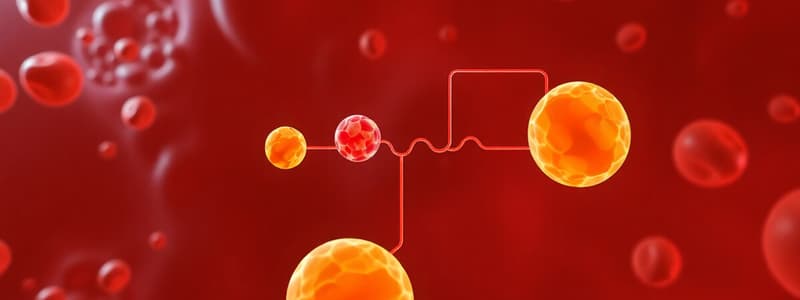Podcast
Questions and Answers
What is the primary location where glycolysis occurs in both prokaryotic and eukaryotic cells?
What is the primary location where glycolysis occurs in both prokaryotic and eukaryotic cells?
- Mitochondrial matrix
- Cytoplasm (correct)
- Endoplasmic reticulum
- Nucleus
What is the net gain of ATP molecules produced from glycolysis?
What is the net gain of ATP molecules produced from glycolysis?
- 4 ATP molecules
- 1 ATP molecule
- 3 ATP molecules
- 2 ATP molecules (correct)
Which glycolytic pathway is the most common in animals?
Which glycolytic pathway is the most common in animals?
- Embden-Meyerhof-Parnas Pathway (correct)
- Pentose Phosphate Pathway
- Entner-Doudoroff Pathway
- Glucose-6-phosphate Pathway
Which of the following statements about ATP generation in glycolysis is TRUE?
Which of the following statements about ATP generation in glycolysis is TRUE?
What happens to pyruvate after glycolysis?
What happens to pyruvate after glycolysis?
Which enzyme is responsible for converting pyruvate into a two-carbon acetyl group?
Which enzyme is responsible for converting pyruvate into a two-carbon acetyl group?
Which pathway is also one of the oldest glycolytic pathways found in all cells?
Which pathway is also one of the oldest glycolytic pathways found in all cells?
Which organism can use both the Entner-Doudoroff and the Embden-Meyerhof-Parnas pathways for glycolysis?
Which organism can use both the Entner-Doudoroff and the Embden-Meyerhof-Parnas pathways for glycolysis?
Flashcards are hidden until you start studying
Study Notes
Glycolysis Overview
- Universal metabolic pathway for glucose breakdown in bacteria, archaea, and eukaryotes.
- Produces energy, electron carriers, and building blocks crucial for cell metabolism.
- Considered an ancient process, present in all living organisms.
Oxygen Use
- Operates in both aerobic and anaerobic conditions; does not require oxygen.
Location
- Occurs in the cytoplasm of both prokaryotic and eukaryotic cells.
Process
- Initiates with one six-carbon glucose molecule.
- Concludes with two three-carbon pyruvate molecules.
- Pyruvate can undergo further breakdown for additional energy; some organisms depend solely on glycolysis for ATP generation.
Types of Glycolysis
- The Embden-Meyerhof-Parnas (EMP) pathway is the predominant type in animals and various microbes.
Phases of Glycolysis
- Energy Investment Phase:
- Requires 2 ATP for glucose modification, splitting it into two three-carbon molecules (G3P).
- Energy Payoff Phase:
- Converts G3P to pyruvate, generating 4 ATP and reducing 2 NAD+ to NADH.
ATP Production
- ATP is synthesized via substrate-level phosphorylation; a phosphate group is directly transferred from a donor to ADP.
Net Gain from Glycolysis
- Results in a net gain of 2 ATP, 2 NADH, and 2 pyruvate molecules.
Other Glycolytic Pathways
- Embden-Meyerhof-Parnas (EMP) Pathway:
- Primary glycolytic pathway for animals and many bacteria.
- Entner-Doudoroff (ED) Pathway:
- Identified by Nathan Entner and Michael Doudoroff.
- Utilized by some bacteria, including Pseudomonas aeruginosa and E. coli, which can utilize either ED or EMP.
- Pentose Phosphate Pathway (PPP):
- Present in all cells; distinct from EMP and ED pathways.
- Recognized as one of the oldest glycolytic pathways.
- Supplies intermediates vital for producing nucleotides and amino acids.
- Important for cells needing to synthesize nucleic acids or proteins.
Transition Reaction (Bridge Reaction)
- Converts pyruvate into a two-carbon acetyl group utilizing the enzyme pyruvate dehydrogenase.
- Produces NADH from NAD+ in the process.
- Acetyl group attaches to Coenzyme A (CoA) to continue metabolism.
- Occurs in the mitochondrial matrix in eukaryotes and in the cytoplasm of prokaryotes.
Studying That Suits You
Use AI to generate personalized quizzes and flashcards to suit your learning preferences.




